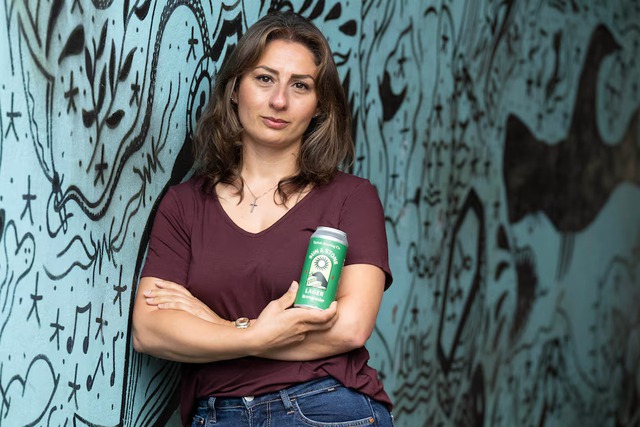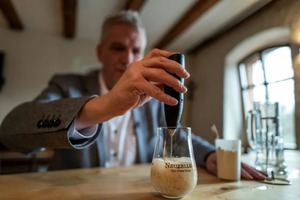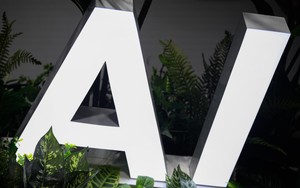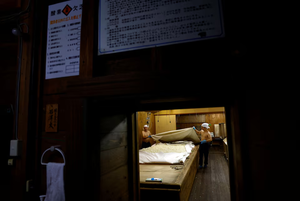
Brewmaster Madees Khoury poses for a portrait at a mural celebrating a Palestinian lager launched by Taybeh Brewing Co., a microbrewery based in the Israeli-occupied West Bank, with the help of Scottish brewer Brewgooder, in Glasgow, Scotland, Britain, September 3, 2025. Photo: Reuters
"We make beer, but it's not just beer — it's a story," says Madees Khoury, general manager of what is widely considered the Middle East's oldest microbrewery, Taybeh Brewing Co.
Since joining the family business in 2007, when she says she trained to become the region's first and only female brewmaster, Khoury has helped drive that story forward and further, extending Taybeh's reach to 17 countries across Europe, Asia and North America and expanding its brewing capacity.
That effort has not been without hurdles.
Running the business in its namesake village (whose name fortuitously means 'delicious' in Arabic) in the Israeli-occupied West Bank makes exporting a challenge — one that Khoury says has only worsened since October 7, 2023.
Recent Israeli settler attacks have left many residents feeling helpless.
Speaking with Reuters from Glasgow, where she recently unveiled a new collaboration with the Scottish firm Brewgooder, Khoury reflects on the evolution of beer-making in the region, the challenges of brewing under occupation, and why she sees beer as a form of Palestinian soft power.
This conversation has been edited and condensed for clarity.
What drove you into the beer-making business?
My family started the first microbrewery in the Middle East in 1994, right after the Oslo Accords.
I pretty much grew up in the brewery: folding boxes and being in my dad and uncle's way and running around and just watching them build a business.
Right after college (in) Boston, I decided to book a one-way ticket and move back and work with the family full-time.
I've been officially working since 2007, but technically since I was nine years old.
Although you're usually based in Taybeh, this week you're speaking to us from Scotland, where brewing goes back centuries. What took so long for the practice to make it to the Middle East, and what inspired your family to pursue it?
If we're going to go way back: When the pyramids were being built, the workers were getting paid with beer and bread because, at the time, beer was cleaner than water. Some people say that beer first started in (modern-day) Iraq. So there's a history of beer making and winemaking in the region.
My family goes back 600 years in Taybeh. My dad picked up on home-brewing when he was studying business (in Boston), and he used to make beer in the dorms. After college, he went to UC Davis in California and became a master brewer. It was his dream to open a brewery.
My uncle and dad were thinking of opening a brewery in Boston, but when Oslo happened in 1993, there was a hopeful future for Palestinians. My grandfather wanted his two sons to come back to Palestine, for us kids to learn the language and culture and to grow up in Taybeh.
So he told them, "Why not open a brewery in Palestine?" My dad and uncle challenged my grandfather and told him, "If you can get us the permits and licenses to open a brewery, we'll move back. If not, we're staying."
So immediately, my grandfather bought the land, built the building, and got the permits and licenses. He even went to Yasser Arafat and got the blessing from him and told my dad and uncle, "yalla," which means 'come on.' So that's how it started in 1994. (We) launched the first beer in August, the Taybeh Golden.
My dad's name, Nadeem, in Arabic it means your drinking companion, the person you drink with. The man was destined to make beer and wine!
What's it been like working in such a relatively male-dominated industry?
I think for female brewers all over the world, it's challenging to be in a supposedly male-dominated industry. And then being in an Arab country, which is male-dominated as well and also being under (Israeli military) occupation, I feel like I have it three times, four times harder.

Brewmaster Madees Khoury holds a lager as she poses for a portrait near a mural celebrating a Palestinian lager launched by Taybeh Brewing Co., a microbrewery based in the Israeli-occupied West Bank, with the help of Scottish brewer Brewgooder, in Glasgow, Scotland, Britain, September 3, 2025. Photo: Reuters
How do people typically react when you tell them what you do for a living?
It surprises a lot of people, which I enjoy: surprising people and showing a different side of Palestinian women.
Dealing with the male figures — whether (it's) restaurant owners, hotel owners, bartenders or bar waiters — was challenging at first, especially with the older generation. They would rather work with my dad and uncle. But with the support of my dad and uncle, the customers got used to working with me. It's changed over the years with the different generations. The younger generation is not too challenging to work with.
When people think of Palestinian products, they might think of dates or olive oil or Nabulsi soap. Do you see Taybeh beer as another kind of soft power?
Absolutely. I get a lot of friends sending me messages (saying) we found Taybeh in Germany or Belgium. If they drink or don't, they're just proud that there's something from Palestine in those countries and people are enjoying them.
You know, that bottle of beer went through struggles and challenges to get to your hands. And it's not just the Palestinian people that are under occupation; it's also our products. When people find Taybeh, they don't know that Palestinians have the first microbrewery in the Middle East or that we drink alcohol or that there's a female brewer or an Oktoberfest. So they want to learn more about the beer, the business, Palestine, Palestinians. So I think it's a symbol, and it shows a different side of Palestine and Palestinians.
Can you walk us through the process a bottle of Taybeh has to go through to get to overseas markets?
As a Palestinian company, we're not allowed to load containers on-site at the brewery. We have to load them on pallets to a certain height. So instead of fitting a container with 1,400 cases loose, it ends up fitting 840 cases on pallets to like 180cm (5.9 feet).
We're not allowed to go through any road. We have to go through specific commercial checkpoints and, in order to pass those checkpoints, we have to get a permit from the Israelis. They give us the permit last minute before the closing date of the vessel, so you have a small window to make it on time. And many times we don't make it on time. For example, we have a shipment that's supposed to come to the UK. It was supposed to be loaded today at the port, but we didn't get the permit until now, so we missed this shipment. It's probably going to be scheduled on the following vessel.
Once we get the permit, we have a Palestinian driver that comes and picks up the beer early morning or the night before so that at 6 o'clock in the morning, they're at the commercial checkpoint. And we have to have another Israeli truck on the other side of the commercial checkpoint at the same time, otherwise they lose their turn. Now, after a security check and paperwork, they unload the first truck and then load the second truck.
By the time they finish this process, if it's before, let's say, 12:00 or 2:00 pm depending on the day, they continue to the warehouse at the port. If not, they leave the beer overnight at the checkpoint, pick it up the next morning, and then drive it to the warehouse. At the warehouse, it goes through another security check because it's Palestinian. Since October 7, they've become even more strict, making us go through another manual security check. This is extra cost, extra delay. And it's just frustrating that just because it's Palestinian, it has to go through all these hurdles.
If you look on the map, from Taybeh to Haifa Port or Ashdod Port, it's an hour, an hour and a half. But in reality, it takes three days for the beer to get to the port and it costs twice as much as from the port to France or to Europe. (Editorial note: The Israeli military did not immediately respond to a request to comment.)
How has the worsening situation in the West Bank impacted your business?
We've been doing business for the past 31 years, and I think these past two years have been the most difficult.
The settler violence has increased. It has been going on even before October 7, but on a smaller scale. But since the beginning of 2025, it's escalated quickly and aggressively. These past two months, we've had settler attacks on a daily basis .
Us personally and the brewery have not been attacked yet, and hopefully never. But damaging the water pipes at the spring (as Israeli settlers have in recent months ) does affect the brewery.
We don't want problems. We don't want violence. No one does. But they continue to instigate these problems, and they're confiscating a lot of land. They're just closing us in in the West Bank. This is just Taybeh, but every town and city is undergoing violence.
What recourse do you have?
What can we do? As Palestinians, we have no protection. If you try to defend your land and defend your home, you can get shot by the Israeli settlers with no repercussions. The only thing we can do is continue to work and to build and to speak up, regardless of how low our Palestinian voices are. We just continue to be hopeful and continue to work for a better and a peaceful future.
Taybeh was among the earliest companies to enter the low- and no-alcohol beer market. What inspired that?
Palestine is like any other country — you have Muslims who don't drink at all, you have Muslims who are very open and liberal and who do drink openly, you have Muslims who don't drink openly, you have Christians, expats, tourists. You have everything, but it's a smaller market.
The non-alcohol (brew) is 0.00%, which we're very proud of. My dad jokes that there's more alcohol in fresh squeezed orange juice than in our non-alcoholic beer. We made the non-alcohol in 2010 to expand the local market; to get into the markets where there is no alcohol, where we want the brand Taybeh as a Palestinian product to be available for our Palestinian consumers.
What's your ambition for Taybeh going forward?
We export to 17 countries, but we're still small. We're still a microbrewery.
These past two years have been very difficult — not just for the brewery, (but) for all of Palestine and Palestinians and businesses.
We took advantage of the slow business days to expand, so we have built a bigger brewery — new tanks, new machinery, double the quantity, double the size, double everything — in the hopes that once things settle down, we'll be ready to charge the market with more types of products.
We're getting ready to build more and to do more.





Max: 1500 characters
There are no comments yet. Be the first to comment.